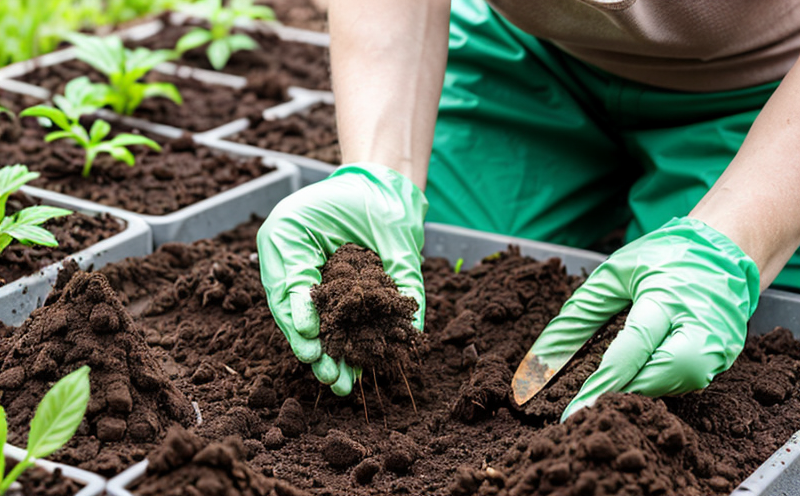JIS K 6758 Odor Testing of Outdoor Gardening Plastics
The Japanese Industrial Standard (JIS) K 6758 sets forth a method for evaluating the odor emissions from outdoor gardening plastics. This standard is crucial in ensuring that products used in garden settings do not emit odors that could be offensive or harmful to human health and the environment. Odor testing is particularly important for materials like mulch films, plastic pots, planters, and other items that are frequently exposed to sunlight, rain, and other environmental elements.
The process involves placing a sample of outdoor gardening plastics in a specially designed chamber where it undergoes exposure to air flow and temperature conditions that mimic real-world use. The test aims to detect any volatile organic compounds (VOCs) released by the material over time. Once the testing period is complete, trained odor panels assess whether or not the emissions are within acceptable limits as defined by JIS K 6758.
This service ensures compliance with international standards while providing valuable data for product development and quality assurance. It helps manufacturers identify potential issues early on in their product lifecycle and make necessary adjustments to meet regulatory requirements and customer expectations. By adhering to this standard, companies can enhance the reputation of their brand by delivering products that are not only functional but also environmentally friendly.
The testing process begins with careful selection of appropriate samples according to specified dimensions and weight ranges outlined in JIS K 6758. Prior to testing, specimens must be preconditioned under controlled environmental conditions to simulate actual usage scenarios. During the test run, sensors continuously monitor changes in air quality within the chamber, capturing data on VOC levels at regular intervals.
The results of this odor emission assessment are then analyzed by experts who determine whether they fall below specified thresholds established by JIS K 6758. Compliance with these standards is essential for manufacturers aiming to enter specific markets or gain certification from reputable bodies such as UL, NSF International, or similar organizations.
For those involved in the design and production of outdoor gardening plastics, understanding how various factors influence odor emissions can help optimize formulation processes. For instance, certain additives used during manufacturing may enhance durability but also increase the likelihood of unwanted odors developing over time. Identifying these tradeoffs early allows for more informed decisions about ingredient selection.
It is worth noting that while JIS K 6758 provides guidance on odor testing methods for outdoor gardening plastics, it does not address all aspects related to material performance in this application area. Other factors such as UV resistance, flexibility, biodegradability, and antimicrobial properties should also be considered when developing new products.
In summary, JIS K 6758 offers a robust framework for evaluating odor emissions from outdoor gardening plastics, helping manufacturers ensure their products meet strict quality standards. By leveraging this service, businesses can maintain competitive advantage by producing high-performance yet environmentally conscious materials that satisfy both regulatory demands and consumer preferences.
- Mulch films
- Plastic pots
- Planters
- Other garden accessories
Applied Standards
In addition to JIS K 6758, several other international standards provide additional guidelines for odor testing in the context of outdoor gardening plastics:
- JIS Z 0219: General requirements for plastic materials used in packaging products - Determination of volatile organic compounds
- ASTM D3478-15: Standard test method for determining odors from plastic materials by dynamic headspace gas chromatography/mass spectrometry (DGC/MS)
- EN 12089-2: Packaging - Determination of volatile organic compounds in packaging materials
These standards offer complementary approaches to odor assessment, allowing for comprehensive evaluation across different phases of product development.
Industry Applications
- Mulch films designed to retain moisture and suppress weed growth
- Plastic pots that provide optimal root environment for plants during cultivation
- Planters intended to enhance aesthetic appeal while protecting young seedlings from harsh conditions
- Garden accessories such as benches, tables, or chairs made from durable plastic materials
The application of JIS K 6758 ensures that these products do not contribute to unpleasant odors in gardens or public spaces.
Eurolab Advantages
At Eurolab, we pride ourselves on offering comprehensive services tailored specifically for the needs of our clients operating within diverse industries. Our expertise lies in providing accurate and reliable odor testing solutions for outdoor gardening plastics compliant with JIS K 6758.
- Accurate Testing Equipment: Utilizing state-of-the-art analytical instruments capable of detecting even trace amounts of volatile organic compounds.
- Experienced Staff: Our team consists of highly skilled professionals trained in conducting odor assessments according to various international standards.
- Comprehensive Reporting: Detailed reports are provided summarizing test results alongside recommendations for improvement where necessary.
We understand the importance of meeting strict regulatory requirements and helping our clients achieve their business objectives. With Eurolab, you can rest assured that your products will undergo thorough evaluation ensuring they meet all relevant standards including JIS K 6758.





